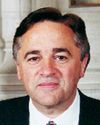Mr. Speaker, my question is for the Minister of Transport. Last Friday, the minister answered a question asked by the hon. member for Louis-Hébert concerning the criteria which led to the closure of the radar control facility at the Quebec City airport. The Minister of Transport said that the review process was being applied to the country's entire air traffic control system. He said, and I quote: "I can assure my hon. colleague that the
same criteria will be applied, whether it be in Quebec City, Calgary, Moncton or Vancouver."
Was proximity the determining factor in the decision to transfer the radar control facility from Quebec City to Montreal, since it is located 120 air miles from the control centre in Montreal?













